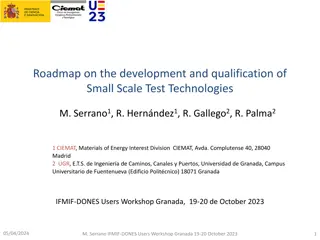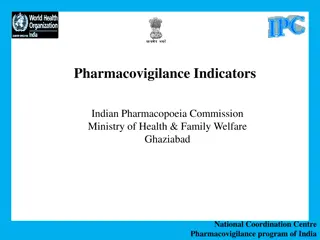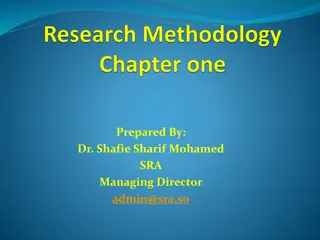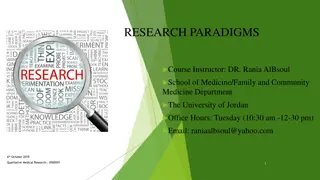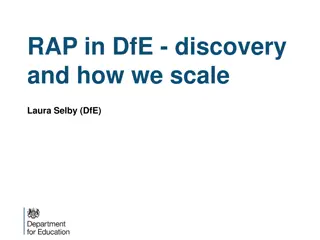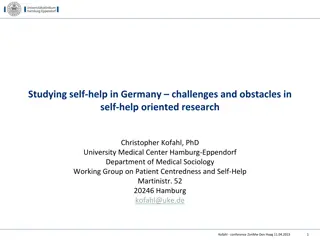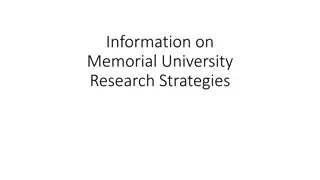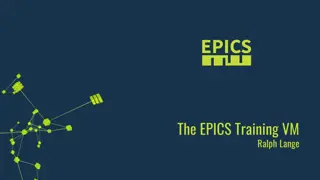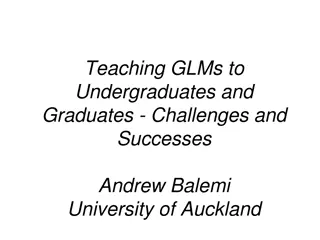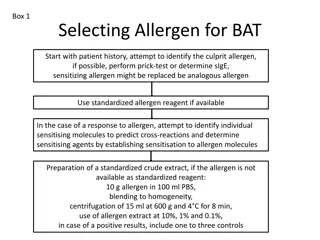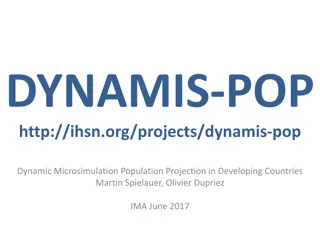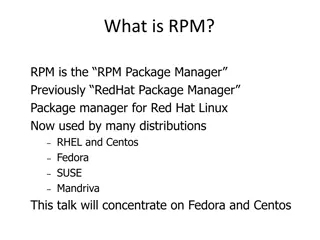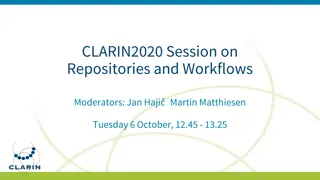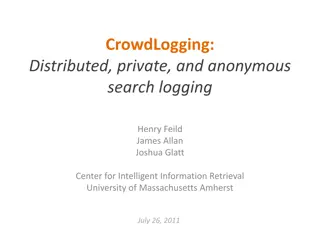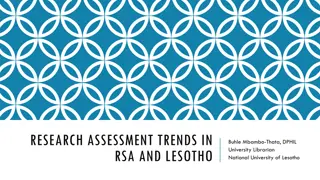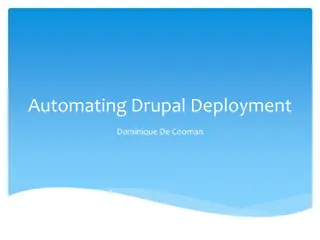Addressing Contemporary Challenges in Research Security Program Development
The Workshop to Inform Development of the Research on Research Security Program (RRSP) focuses on safeguarding the research enterprise amidst evolving global threats. Led by Dr. Rebecca Keiser and Dr. Shawna Cox, the program aims to balance security measures while maintaining an open and collaborati
3 views • 16 slides
Safeguarding Canada's Research: Policy on Sensitive Technology Research and Affiliations of Concern (STRAC)
Canada's new Policy on Sensitive Technology Research and Affiliations of Concern (STRAC) aims to protect the country's research ecosystem from foreign entities posing security risks. The policy restricts funding for projects involving sensitive technology research if affiliated with military or stat
1 views • 10 slides
Development and Qualification of Small Scale Test Technologies in Structural Engineering
Small Scale Test Technologies (SSTT) play a crucial role in determining the mechanical properties of materials used in engineering applications. This roadmap focuses on the importance of testing relevant volumes to ensure transferability to real-world structures. It discusses the need for consistent
0 views • 26 slides
UCC Research Support and Strategies Overview
UCC's Research Support, Policy & Strategy function, led by David O'Connell, PhD, provides comprehensive support for research activities at the university. The office manages research funding, monitors performance, and facilitates engagement with external stakeholders. UCC's involvement in Horizon Eu
3 views • 17 slides
Pharmacovigilance Indicators for Monitoring Health Interventions in India
The pharmacovigilance indicators outlined by the Indian Pharmacopoeia Commission focus on evaluating the status of pharmacovigilance systems in India. These indicators help measure the effectiveness of health services and interventions, identify strengths and weaknesses, and determine the impact and
2 views • 14 slides
Importance of Testable Hypotheses in Scientific Research
Hypotheses play a crucial role in scientific research as they provide a clear statement that can be tested. A genuine research hypothesis must be specific, testable, and falsifiable. It guides researchers in planning studies and helps in determining the outcomes. A good research hypothesis is clear,
0 views • 14 slides
Effective Proposal Writing for Health Research
Learn about the fundamentals of research proposals for health-related studies, including defining research, understanding the purposes of health research, and exploring motivation for undertaking research. Discover the difference between basic and applied research, examine types of research, and del
1 views • 70 slides
Overview of Research Problem Identification and Formulation
Understanding the importance of defining a research problem, this content delves into the selection and formulation of research problems, the definition of a research problem, reasons for defining it, methods for identifying research problems, sources of research problems, and considerations in sele
1 views • 11 slides
Understanding the Essence of Research: A Comprehensive Overview
Research is a systematic pursuit of new knowledge, aiming to unveil hidden truths through data collection and analysis. This course outline delves into the fundamentals of research, covering topics such as types of research studies, importance of research, and distinctions between pure and applied r
2 views • 32 slides
Epic Tools for Clinical Research by Shara Power, RN, BSN, OCN
Explore Epic tools for clinical research developed by Shara Power, a skilled application developer specializing in EPIC Beacon Oncology at UIHC Healthcare Information Systems. Learn about managing research study records, investigational study medication orders, and the process for creating and using
0 views • 26 slides
Understanding Research Paradigms in Qualitative Medical Research
Delve into the world of research paradigms in qualitative medical research with a focus on the key differences between objective and subjective research, the meaning of research paradigms, components of research paradigms, types of research paradigms, and how paradigms guide the selection of researc
0 views • 42 slides
Guidelines for Selecting Research Project Topics in Environmental Health
Research is crucial for addressing environmental health issues. Choosing a good research topic is the first step towards effective research. This paper discusses the meaning, characteristics, types of research, and the research process to help in selecting appropriate research topics. Understanding
0 views • 15 slides
Comprehensive Research Training Programme in Social Sciences
Delve into the Research Training Programme offered by the Graduate School of Social Sciences, led by Professor Mark Tranmer. Explore the importance of research methods training, course offerings under the Research Training Programme (RTP), the Certificate in Social Science Research Methods (CSSRM),
5 views • 11 slides
Terra Architecture and Design Overview
Terra is a platform driven by the Data Biosphere vision to enable an ecosystem of interoperable components across organizations. It utilizes GA4GH standards and serves various roles such as Biomedical Researchers, Custom Apps & Portals, and Data Developers. The architecture is being restructured to
0 views • 8 slides
Reproducible Groundwater Science Workflows: Enhancing Decision Support for Texas
Explore the significance of reproducible science workflows in the context of Texas Groundwater Availability Models. Learn about challenges, solutions, and the importance of creating sustainable environmental decision support systems.
0 views • 14 slides
Study on MgO Deposition Using (CpEt)2Mg and H2O
Investigation conducted in April 2014 on MgO deposition process using (CpEt)2Mg and H2O. Initial attempts showed non-uniformity, with subsequent optimization leading to uniform deposition on MCPs. Thickness measurements taken on Si and MCPs revealed reproducible results with slight depletion in prec
0 views • 8 slides
Enhancing High Energy Physics Research Through Analysis Preservation and Generator Tuning
Delve into the world of high-energy physics with a riveting journey through the analysis preservation and tuning of hadronic interaction models. Learn about the motivation, goals, and processes involved in making research results accessible, publicly available, and reproducible. Explore the tools an
0 views • 23 slides
Icelandic Research Fund 2015: Enhancing Scientific Research and Education
The Icelandic Research Fund (IRF) aims to enhance scientific research and education in Iceland by awarding funding to research projects led by individuals, teams, universities, research institutes, and companies. Principal investigators must have completed graduate studies and experience in running
0 views • 22 slides
Transformation Through Reproducible Analytical Pipeline (RAP) at DfE
Discovery and scaling of RAP initiative at the Department for Education (DfE) to enhance statistical reporting, improve data dissemination efficiency, and meet user needs. The journey began with a focus on code effectiveness and reproducibility, leading to notable findings and recommendations for ex
0 views • 7 slides
Challenges in Self-Help Research in Germany
Exploring the landscape of self-help research in Germany reveals various challenges and obstacles faced by researchers in studying self-help initiatives. The research delves into different aspects such as research scope, involvement of various groups, and the entities conducting research in this dom
0 views • 14 slides
Introduction to Galaxy for NGS Data Analysis
Explore the capabilities of Galaxy, a web-based platform for computational biomedical research. Learn about aligning raw NGS data, peak calling, and basic operations with genomic intervals. Discover how Galaxy enables accessible, reproducible, and transparent analysis through user-friendly tools and
0 views • 19 slides
Memorial University Research Strategies Overview
Memorial University's research strategies focus on attracting, retaining, and supporting researchers, fostering an environment of research excellence, engaging with community partners, and supporting fundamental and applied research. The university's strategic priorities include synergy in applicati
0 views • 11 slides
EPICS Training VM - Hands-On Training Setup Using Ansible Automation
Hands-on training setup using the EPICS Training VM, a reproducible platform based on Oracle VirtualBox. The VM simplifies installations with Ansible automation, allowing trainees to start quickly with pre-configured environments. The platform supports various host operating systems and provides mod
0 views • 8 slides
Teaching Generalized Linear Models (GLMs) to Undergraduates and Graduates: Challenges and Successes
Teaching GLMs at the University of Auckland involves a collaborative effort, utilizing reproducible research techniques and foundational linear modeling concepts. The courses cover trend analysis, factor variables, mixing variables, and handling exceptions like curves and exponential relationships.
0 views • 19 slides
Basophil Activation Test (BAT) in Allergy Diagnosis and Monitoring
Basophil Activation Test (BAT) is a valuable tool in diagnosing and monitoring allergies. It involves taking a structured patient history, confirming allergen identity through objective tests like prick tests or sIgE measurement, and monitoring basophil sensitivity. BAT can be useful in various clin
0 views • 4 slides
Automated Purification System: KingFisher Flex & Duo
Explore the KingFisher automated purification system featuring the Duo and Flex models. Learn about the principles, components, operational simplicity, plate specs, applications, and key value propositions. Discover how these systems offer improved workflow, reduced hands-on time, scalability, and r
0 views • 26 slides
Dynamic Microsimulation Projection Tool for Developing Countries
The DYNAMIS project, funded by the World Bank, aims to demonstrate the feasibility of dynamic microsimulation for population projections in developing countries. This portable platform offers highly disaggregated population projections and serves as a core component for simulating social development
0 views • 24 slides
Enhancing Flow Cytometry Practices for Accurate Data Analysis
Explore the realm of forensic flow cytometry with emphasis on improving data quality through proper titration and blocking techniques. Learn to identify and address common flow cytometry issues in various experimental cases to ensure reliable and reproducible results. Dive into practical rules and m
0 views • 39 slides
Understanding the Scientific Method: Key Concepts and Steps
Exploring the essence of science through definitions, types of science, and the scientific method. Emphasizes the importance of asking well-defined questions, developing testable hypotheses, setting up reproducible experiments, and making predictions based on established knowledge. An insightful jou
0 views • 27 slides
Understanding RPM Package Manager for Fedora and CentOS
RPM (Red Hat Package Manager) is a critical package management system used by various Linux distributions like Fedora and CentOS. It simplifies software handling by tracking system packages, facilitating easy upgrades, and ensuring reproducible builds. This technology overview delves into RPM basics
0 views • 18 slides
Advances in Digital Humanities: CLARIN2020 Sessions Overview
Presentations at CLARIN2020 highlighted enhancements to research tools, reproducible annotation services, and the transition to more generalized repository systems. Discussions encompassed the optimization of Wittgenstein research tools, reproducibility in WebLicht workflows, and the implementation
0 views • 13 slides
Effective Strategies for Writing a Research Paper
Formulate a clear title, define goals and research questions, address assumptions and limitations, and include important details for a reproducible study. Consider the target audience's needs, the paper's originality, and promotion strategies, inspired by journalistic techniques. Maintain strict lan
0 views • 7 slides
Distributed Search Logging: CrowdLogging vs. Centralized Model
CrowdLogging provides a distributed, private, and anonymous approach to search logging, contrasting with the centralized model that lacks user control and privacy. It offers advantages such as improved sharability and reproducible research results. The drawbacks of the centralized model include lack
0 views • 26 slides
Research Assessment Trends in RSA and Lesotho: Issues, Challenges, and Forward Strategies
Research assessment in RSA and Lesotho involves evaluating research quality, measuring inputs, outputs, and impacts using both qualitative and quantitative methodologies. The prevailing practices include assessing research productivity for progression and utilizing various assessment mechanisms to e
0 views • 7 slides
Reproducible Research and Software in Python
This presentation by Quentin Peter focuses on the importance of reproducible research and software development, particularly in a Python environment. It delves into key aspects such as ensuring replicability, version control, automation, and documentation. Practical examples and strategies are provi
0 views • 21 slides
NetLogo - Programmable Modeling Environment for Simulating Natural and Social Phenomena
NetLogo is a powerful and versatile programmable modeling environment created by Uri Wilensky in 1999. It allows users to simulate natural and social phenomena by giving instructions to multiple agents operating independently, making it ideal for modeling complex systems evolving over time. NetLogo
0 views • 7 slides
Managing Software Environments for Reproducibility
Efficient management of computational environments is crucial to ensure software reproducibility. Learn how to record software environments, use tools like Miniconda and pip for package installation, and manage R packages for reproducible research.
0 views • 17 slides
Complete Guide to Automating Drupal Deployment by Dominique De Cooman
Dominique De Cooman shares insights on automating Drupal deployment for faster, error-free, well-documented, reproducible, and easily controllable processes. Learn about essential components, setting up a VPS, installing LAMP stack, version control with Git, using Drush, organizing Drupal repository
0 views • 19 slides
Exploring Research Design and Funding Priorities in Northern Ireland
Dive into the world of research at the upcoming Application and Research Design Workshop scheduled for Friday, 28th May 2021. Discover the strategic priorities driving impactful research initiatives, learn about current research projects, funding processes, and collaborations. Explore the rich histo
0 views • 37 slides
Writing Research Papers Effectively: Guidelines and Steps
Effective writing for research involves developing a good research idea, writing a literature review, and understanding the key elements of writing research articles. This process includes coming up with a strong research question, gathering relevant information, creating an outline, writing the dra
0 views • 26 slides


